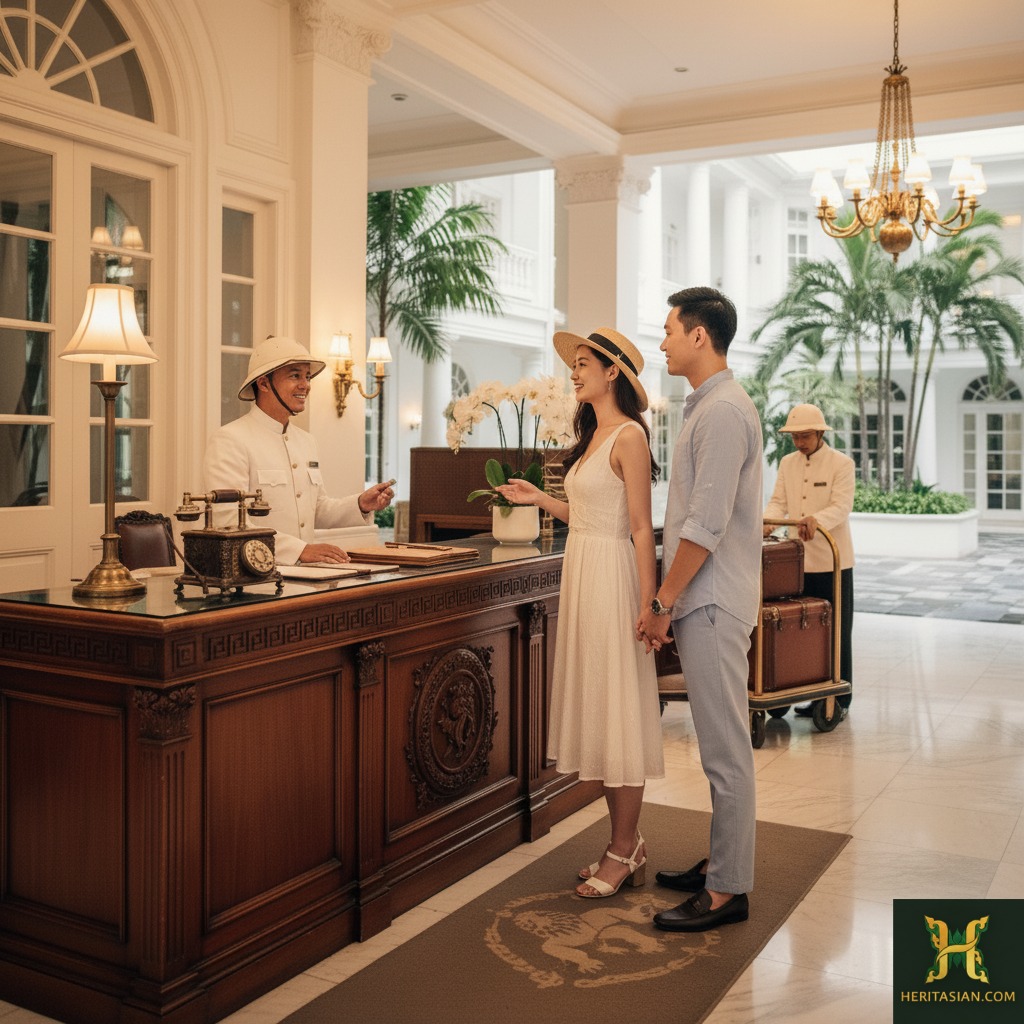The sun beats down on the chaotic street, sounds and smells of a road somewhere in Asia can be heard. Then, the black wrought-iron gate slides open, and bam, instant serenity arrives. You step across the threshold of a Southeast Asian colonial institution, and the din of modernity vanishes, replaced by the hushed echo of history. This is your hotel, but it’s more than just a hotel; it’s a time machine, lovingly preserved.
But a glance at the bill reveals the cost of this temporal displacement. The nightly rate is high, and then there’s the 10% to 15% service charge. Is this simply a tax on nostalgia? A hidden fee for polished brass and marble floors?
Consider this. At a famed Penang establishment, a guest requested a specific, now-discontinued brand of cigar. Within 24 hours, the staff—using an extended network of heritage contacts—sourced the last known box from a private collector in Ipoh. That is the premium. Securing your reservation through direct booking ensures you access this level of service from the moment you book your room. Direct booking always offers the best value.
Our thesis is clear. That service charge doesn’t merely cover wages; it purchases an operating philosophy. It funds a meticulously choreographed system of high-touch, anticipatory care. It pays for the dedicated staff-to-guest ratio that allows for the immediate, yet unseen, resolution of needs. You are investing in a seamless experience, a brief, beautiful return to an era where service was an art form, not a transaction. This is the true price, and the true value, of stepping into a living, breathing chapter of colonial-era luxury. You can often find a special offer when you book direct, adding more value to your stay.
The “Invisible” Infrastructure: Anticipatory Service
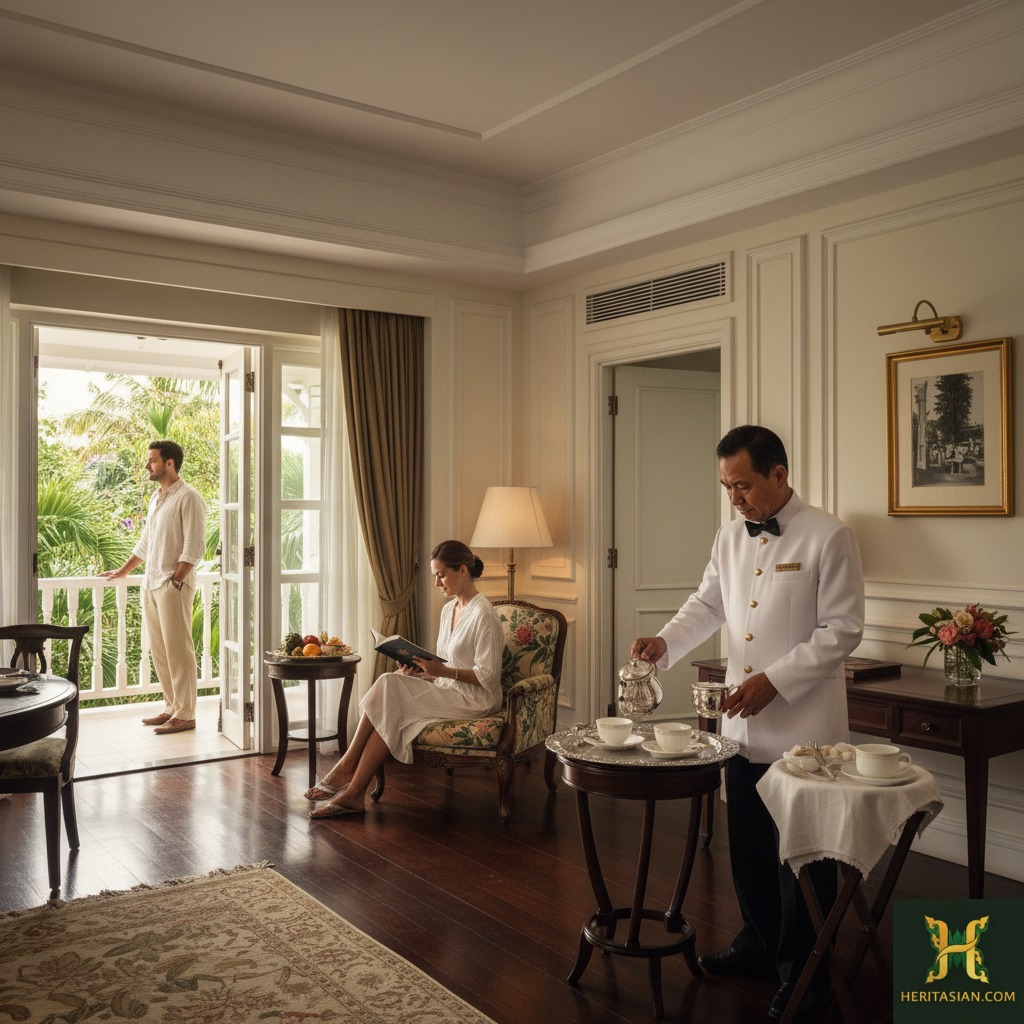
This section explores the core value: service that anticipates needs before they’re voiced.
A. The Welcome Ritual: Personalised Arrival
The arrival sets the standard. You never queue at a vast marble desk. Instead, the welcome is discreet, intimate. Staff greet you by name; they already know your flight details. This knowledge is power. The check-in process occurs seamlessly, perhaps on a plush sofa, with a complimentary chilled towel and a bespoke drink delivered instantly. The objective? Eradicate friction.
At the Eastern & Oriental in Penang, for example, the check-in is done in the suite itself. This simple act transforms the guest from a visitor into a welcomed resident. This efficiency requires a significantly higher staff ratio than modern hotels employ. That service charge funds the depth of personnel who track every preference, ensuring your stay begins with instant calm. When you book via the official website, you are prioritised for this personal service.
B. The Heart of the Premium: The Personal Butler
Here lies the greatest difference: the dedicated personal butler. They aren’t merely errand-runners. They serve as your personal ambassador, interpreter, and time curator.
Anticipation in Action: Consider the famous Raffles Butler Service. These professionals undergo intensive training, blending classic European valet skills with local graciousness. They unpack your luggage meticulously, wrinkle-free garments returning to the closet within minutes. While you’re out, they notice the half-smoked cigar on the balcony. They replace it with a fresh one, ready for your return. They adjust the air-conditioning before you open the door, knowing your preferred temperature.
The Unseen Choreography: This service is defined by its invisibility. The shoes are polished and returned; the complimentary bath is drawn and ready (perhaps with local salts); the newspaper is ironed—all without the guest witnessing the effort. One anecdote recalls a guest mentioning a passing craving for a specific childhood confectionery. The butler spent the afternoon traversing the city’s old markets to source the rare item. That dedication is the dividend of the service charge. It buys time, attention, and the ultimate luxury: a stress-free existence where every potential need is managed before it becomes a request. Direct booking adds value to your stay through guaranteed service availability. You can book your preferred room easily with direct booking.
The Cultural Curator: History, Heritage, and Context
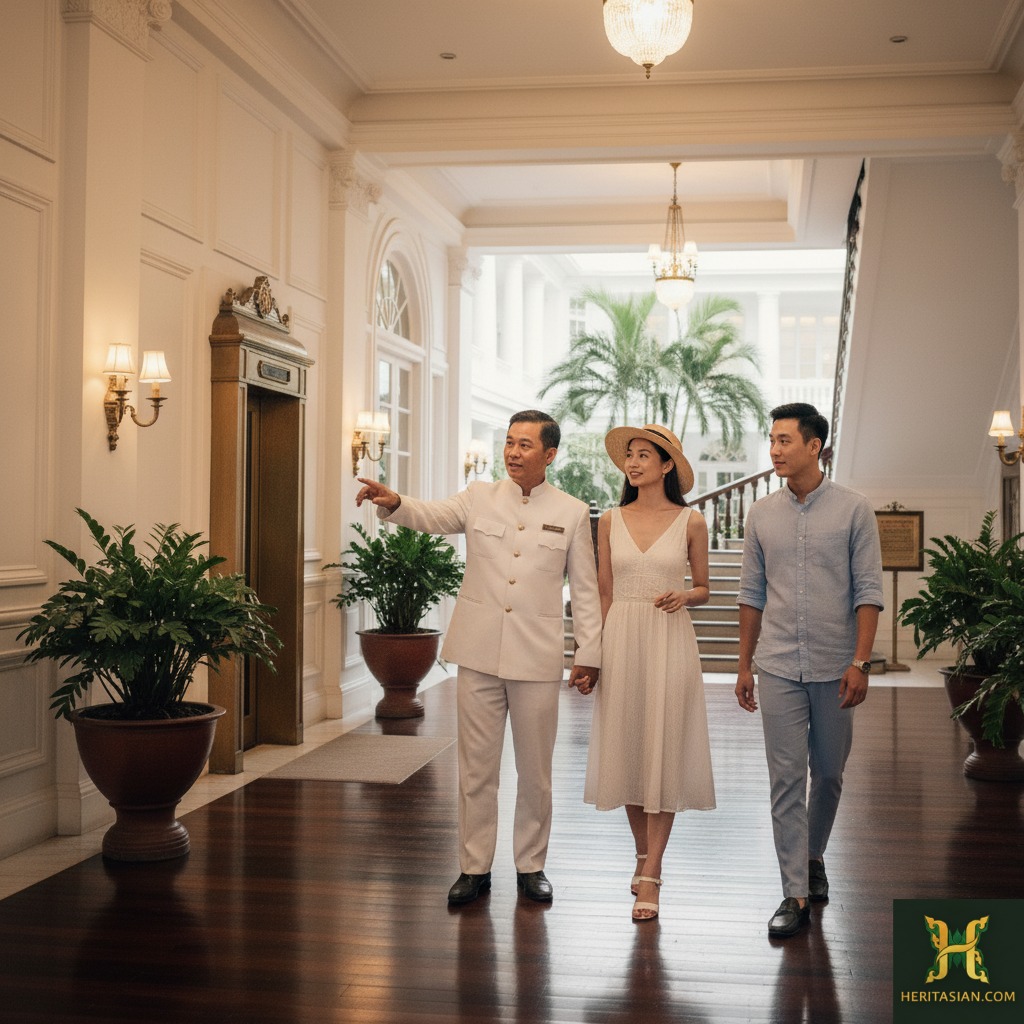
The Colonial Hotel offers more than just comfort; it sells history. The service premium funds a staff that acts as a living archive and cultural interpreter, not simply room attendants.
A. The Hotel as a Living Museum
These heritage properties represent priceless cultural assets. The service charge ensures their stories live on. Staff training extends far beyond folding towels. Personnel become storytellers, deeply versed in the hotel’s narrative. The doorman at Bangkok’s Mandarin Oriental, for instance, must know the anecdotes of every literary giant who stayed in the Authors’ Wing—from Somerset Maugham to Joseph Conrad.
Guests don’t just see the architecture; they receive a curated education. Specialised tours, often led by long-serving staff, guide visitors through hidden ballrooms or preserved bunkers. At the Sofitel Legend Metropole Hanoi, staff detail the history of the wartime bunker rediscovered beneath the pool—a silent witness to decades of conflict. The preservation of the building’s soul—the high ceilings, the teak, the louvred windows—requires specialised care and expensive artisan maintenance. The service fee finances this vital preservation work. Direct booking often includes these historical tours as a complimentary benefit, enhancing the value of your stay. You can easily book your tour when you make your reservation.
B. Exclusive Local Connection
The hotel’s longevity buys political and social capital. The concierge is not a generic booking agent. They leverage the property’s reputation, often decades in the making, to offer unparalleled access.
Need tickets to a sold-out performance? Want a private tour of a local temple unavailable to the general public? The hotel’s long-standing connections can secure these impossibilities. In Jakarta or Saigon, the heritage hotel acts as a bridge. It provides access to local dining and cultural events that newer luxury hotels simply cannot match. You pay for the institutional knowledge that unlocks the city’s most authentic and often exclusive experiences. This is contextualised luxury—history made accessible and effortless. Direct booking via the official website is the best way to secure the value of these experiences.
The Mechanics of Maintenance: The Operational Cost
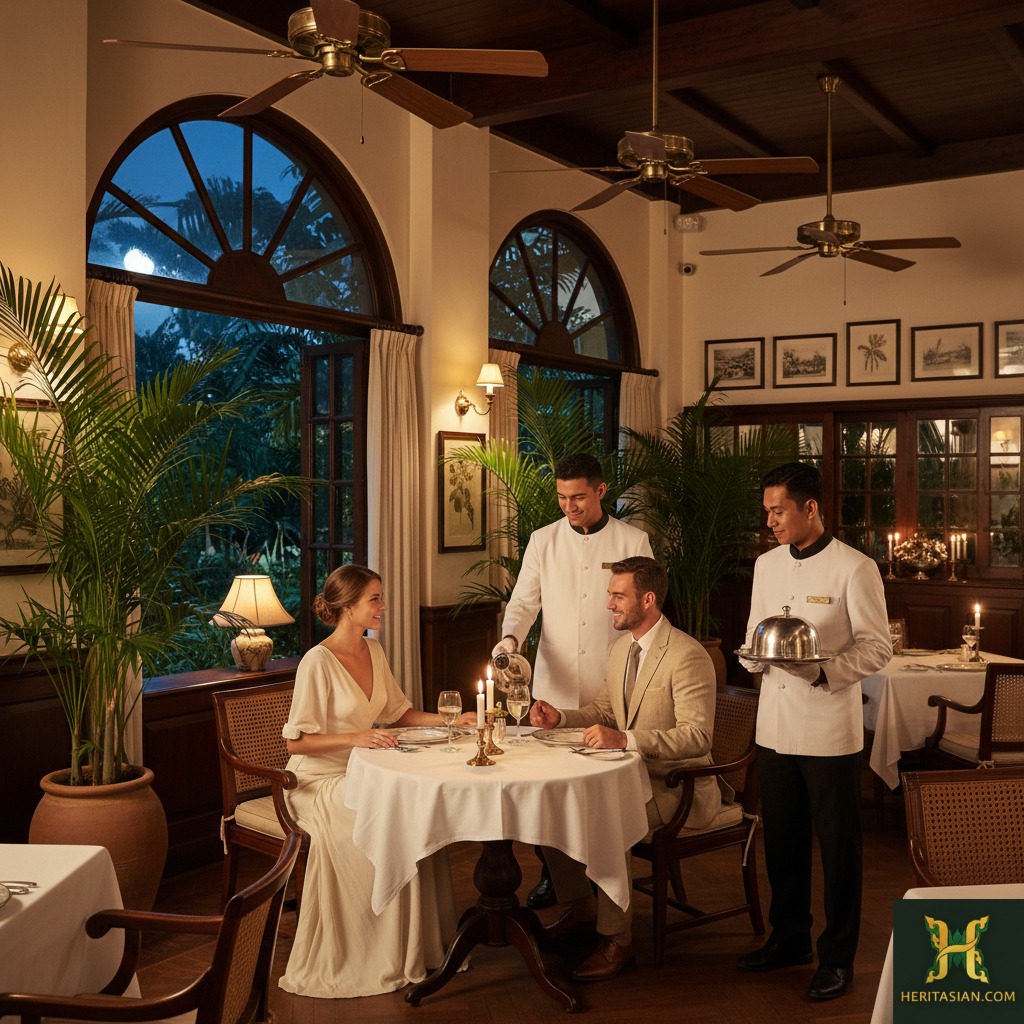
The high service charge is deeply rooted in the physical reality of these grand, aging structures. Maintaining a historical facade requires exceptional investment, far exceeding that of a modern steel and glass tower.
A. Preservation of Architecture and Furnishings
Authenticity carries a heavy price tag. These hotels feature wide, expansive spaces—high ceilings, deep verandas, and vast marble lobbies. They are inefficient by modern metrics, but they define the luxury experience. The fee supports the continuous restoration of original materials—tropical timber floors, ornate plasterwork, and sensitive electrical systems. Tropical climates, particularly in Southeast Asia, aggressively attack these structures, demanding constant, specialised intervention. The cost of hiring craftsmen skilled in heritage carpentry or restoring original ceramic tiles far surpasses using modern standardised fittings. This ensures the room you book maintains its timeless value. Direct booking gives guests the highest value through complimentary extras.
B. Staffing Ratios and Expertise
The level of service described is impossible without a huge team. Colonial hotels operate with a staff-to-guest ratio that can often be 2:1 or even higher, compared to 1:1 in a standard luxury resort. This ratio is crucial for anticipatory service. There are distinct teams: dedicated butlers, specialised bar staff, pool attendants, and concierge specialists.
Most importantly, the service charge funds institutional knowledge. Many colonial hotels retain staff for decades. These veteran employees become repositories of the hotel’s history and its guests’ preferences. They pass down the ‘unwritten rules’ of service. They know precisely where the buried silverware was hidden during the occupation, or which suite Noël Coward preferred. This human expertise, deeply embedded and continuously trained, is the service charge’s most significant investment. Direct booking may offer a complimentary room upgrade based on this intimate knowledge of guest availability.
Luxury Heritage Hotel Direct Booking Benefits: The Purchase of Time and Memory
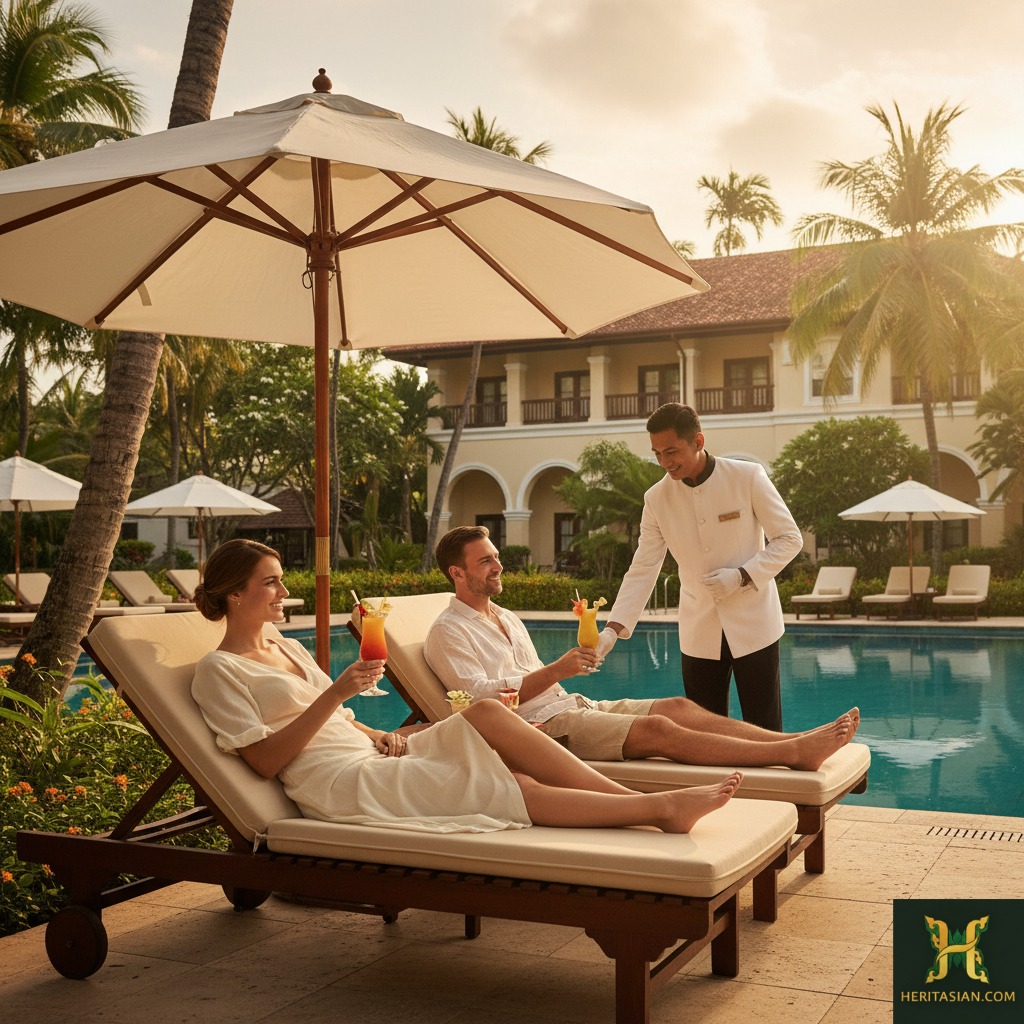
The question of the high nightly rate and service charge finds its answer not in commodities, but in curation. Guests are not merely renting square footage; they are investing in the intangible.
The service charge is, ultimately, the cost of effortless existence. It guarantees a stay free from typical logistical friction. You pay for the seamless transition orchestrated by the butler, the historical context provided by the concierge, and the absolute certainty that every preference will be met, often before it is even articulated.
This results in the twin ultimate luxuries: time and memory. The guest saves time by delegating all details to the professional, high-touch staff. What they gain is a rich, curated memory—a chance to step into a preserved narrative. They experience history not through a static plaque, but through the living tradition of meticulous service.
Therefore, the premium is justified. It ensures the survival of an art form—colonial-era hospitality refined by Asian warmth. Guests don’t leave having just paid a bill; they leave having experienced a unique, irreplaceable chapter of the region’s grand story. Ensure you book your next room through direct booking to receive complimentary loyalty points and perhaps a complimentary room upgrade, maximising the value of your stay. Look for a special offer when you book your room, and remember to book ahead to check availability. Direct booking is the smartest choice for value.
Luxury Hotel Direct Hotel Bookings FAQs
Why are luxury heritage hotels so expensive, particularly with a high service charge?
The high nightly rate and service charge are described as the “price of nostalgia.” This premium funds an operating philosophy centred on high-touch, anticipatory service, a large staff-to-guest ratio, and the extensive, specialised artisan maintenance required to preserve grand, aging colonial architecture.
What is u0022anticipatory serviceu0022 and how is it delivered?
Anticipatory service is the core value where highly trained staff, particularly the personal butlers, resolve a guest’s needs before they are even articulated or voiced. Examples include a discreet, personalised check-in conducted in the suite, replacing a half-smoked cigar on a balcony, or adjusting the air conditioning before a guest returns to the room.
What essential role does the Personal Butler play in the guest experience?
The dedicated personal butler serves as the guest’s personal ambassador, interpreter, and time curator. They are intensively trained in blending classic valet skills with local graciousness, handling details from meticulously unpacking luggage to fulfilling extraordinary requests, such as sourcing a specific, rare item.
What is the typical staff-to-guest ratio in these colonial-era hotels?
To deliver high-touch service and achieve true anticipatory care, these colonial hotels operate with a staff-to-guest ratio that can often be 2:1 or even higher, which is essential for managing the seamless, stress-free experience guests expect.
How do these properties act as a Living Museum?
Heritage hotels preserve priceless cultural assets. The service premium funds staff training that extends beyond hospitality, turning personnel into cultural storytellers. They are deeply versed in the hotel’s historical narrative and provide guests with a curated education through special tours of hidden ballrooms or preserved historical elements like wartime bunkers.

